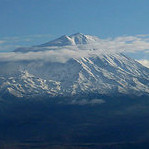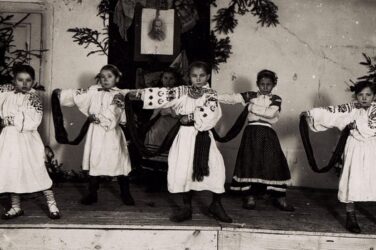The stigma of the bloody history between Armenia and Turkey still lingers despite talks about reopening the border. Looking at Mount Ararat, our two authors talk candidly.
Letter from Armenia
Maria Simonyan is currently studying for a European studies MA at the Yerevan State University. Maria is involved in civil society development in Armenia. She is a trainer, youth worker and the vice-president of ‘Armenian Progressive Youth’ NGO.
Dear Erhan,
It’s not easy for me to write this letter as I can imagine that there are several statements that might be hard for you to accept. Obviously, you may have heard that Armenians have a negative opinion towards Turkish people. The origin of it comes from history and is based on the pain and suffering of Armenians.
Starting from the 15th century, Armenians in the Ottoman Empire tried to preserve their culture, history, language and religious identity among the neighbouring Turks and Kurds. The hostility towards Armenians grew from the time when powerful European countries at the time – especially Britain, France, Germany and Austria-Hungary – wanted to have an influence on the Ottoman Empire by raising the issue of the existence of Armenians in the Ottoman empire, and forcing the implementation of reforms in Armenian populated regions. The Christian Armenian minority wanted to have equality in the empire. But instead of reforms, there were the Hamidian Massacres from 1894–1896, with an estimated 50 000 casualties, and the Adana Massacre of 1909.
However, the darkest page in our history lies in 1915, the year of the Armenian Genocide, when the Young Turks movement decided to exterminate Armenians and killed 1.5 million people. It is very difficult for Armenians to forget the brutal murders of their ancestors and to have normal relations while Turkey officially rejects this historical truth. Moreover, there are several stereotypes concerning Turks, such as “A Turk can never be changed” and “A Turk is a Turk”. Many Armenians think that the normalisation of relations of our countries can be realised only if Turkey apologises and recognises the genocide, as the Germans did with Jewish people.

When Turkey closed the border with Armenia in 1993, there were no diplomatic relations between our countries. Therefore, it was a tremendous shock in history when our presidents started the dialogue to discuss the opening of the border in 2008. I strongly believe that our societies were not ready to commit to such radical changes.
According to the Armenian Sociological Association, 52% of Armenians opposed the deals signed between Armenia and Turkey to establish diplomatic ties and open the border. But 48% of respondents also said they wanted the border to open, compared with only 41% who wanted it to remain closed. Our society considers Turkey to be an enemy state and because of the historical distrust, it’s very difficult for Armenians to change that opinion.
I have a lot of friends whose families came from Van, Mush, Erzrum and other parts of Turkey nowadays. For you it may sound a little bit strange but the territory that you call Eastern Anatolia we call Western Armenia.
Thousands of Armenians, especially from diasporas, whose grandparents were victims of the genocide had a desire to visit that part of Turkey at least once in their lives. It is no coincidence that Mount Ararat is the symbol of Armenia and its view from our side is amazing. I guess it’ll be interesting for you to know that Armenians from the diaspora prefer to buy flats from which they can get a view of the Ararat mountain.
Anyway, the situation is changing now. Armenians want to live in peace and stability as well as to have normal relations with their neighbours.
Different activities and projects have been undertaken between civil organisations from Armenia and Turkey with the support of international organisations since 2009. They aim to enable citizens from the two countries to speak to one another and facilitate the process of reconciliation. Being one of the active representatives of the Armenian civil society, I can prove that there is a certain progress in normalisation of Armenian-Turkish relations.

I hope you will have a chance to come to Armenia. You will see that there are many similarities between Armenians and Turks regarding food and traditions, and the most exciting part is our hospitality. Armenians like to honour their guests, and show their respectful and friendly attitude. Armenians are tolerant and irrespective of your nationality they will accept you in a very warm way.Two weeks ago I was in Turkey and participated in a youth program with Turkish, Armenian and American civil activists. It was my first visit to your country and hopefully not the last one.
Walking and visiting different sightseeing places in Istanbul, I saw a lot of culture and history in this magical city. I was surprised to find that the architects of Topkapi palace museum were Armenians: Sarkis Balyan and Agop Balyan; and the architect of the Dolmabahce palace was Karapet Balyan.
Sometimes it’s very hard to ignore history and start everything from the very beginning. But I personally think that although we can’t change the past, the future is in our hands and we are the creators of our countries’ future history. Thus, I think that the dialogue between our nations, started in 2008 on the president’s level, will continue between our peoples.
Looking forward to see you in Armenia,
Maria
A reply from Turkey
Erhan Vural has recently completed his studies in International Relations at the Middle East Technical University. In the future, he is planning to continue studying International law and specialise in human rights.

Dear Maria,
I would like to start my letter from where you have concluded yours. You are very right, Maria, it might not be that easy to change the already established stereotypes and prejudices towards each society. I can already understand, from the very beginning, that no good opinions exist between neighbours, neither in Turkish nor in Armenian society. In your letter, you reach a great conclusion, arguing that we cannot change the past but the future is in our hands. And I am taking this letter as an opportunity to start to shape that future.
It is totally true that there is a negative attitude in Turkey towards Armenian people from history. With this letter, I would like to start using the ‘language of peace’ and I do not want to label the historical issues as “genocide”, as you said in your letter, or “so-called genocide” as in the popular Turkish usage, because these historical facts are forced to have a political side as well.
On the one hand, there are ideas that it was a direct genocide and 1.5 million people were killed, but on the other hand, there are discussions, mostly conducted by some Turkish scholars and by some Western academics, which indicated that it was the people who were killed during the migration from Anatolia to Syria and it was under conditions of war.
Furthermore, some even have doubts about the number of Armenians living in Anatolia at that time. Although academic approaches are so diversified, I do not want to prejudge the history and I do not want to be a part of that discussion. This is not an attempt to escape from history; on the contrary it is because I do know my country, the society of my country and the negative opinion of Armenians, and even not only Armenians, but also Kurds, Alevis, etc.
There is no explanation and I know that nothing will change the past when I express how sorry I am that Hrant Dink was killed in my county. He was an Armenian journalist and was killed in 2007 by a 17-year-old Turkish nationalist. Turkey is a hard country in terms of freedom, human rights and freedom of expression. And Hrant Dink is only one of the latest victims. He was the exact example in my mind when I explained my ideas about the 1915 events. Personally, I am ready to accept anything about the history, if it is enough to bring Hrant Dink back. But society and the state are not like me, nor are they like those who chanted “We are all Armenians” or “We are all Hrant Dink” in his funeral. I do not want to take sides but only side with peace. I believe that we can, at least, try to change our countries. We can try to do what the history did not do.
Since 2009, relations seem to be changing, especially with the protocols on the establishment of diplomatic and bilateral relations. Bearing in mind that the protocols have not yet been ratified by the parliaments, there are still many tasks for civil society, to contribute to the process of reconciliation. I hope that in a short time the borders will also be opened and we will have better relations, and I hope that we will be able to make a plan to meet somewhere in Anatolia where your grandparents were born and you can tell me the stories that you heard from your grandparents. We might also create a project to clean and restore the churches that your ancestors had used in Anatolia but are now deserted. I hope that the time when you can get a house on Mount Ararat is not very far away. Maybe it is not possible for my generation, but I would like our next generations to have friends in Anatolia whose names are Hayk, Agop, Sasun or Maria. I want to believe that the future will not be like our history.
All the best from Istanbul and looking forward to seeing you soon!
Erhan
Teaser Image: La Funámbula (CC)





